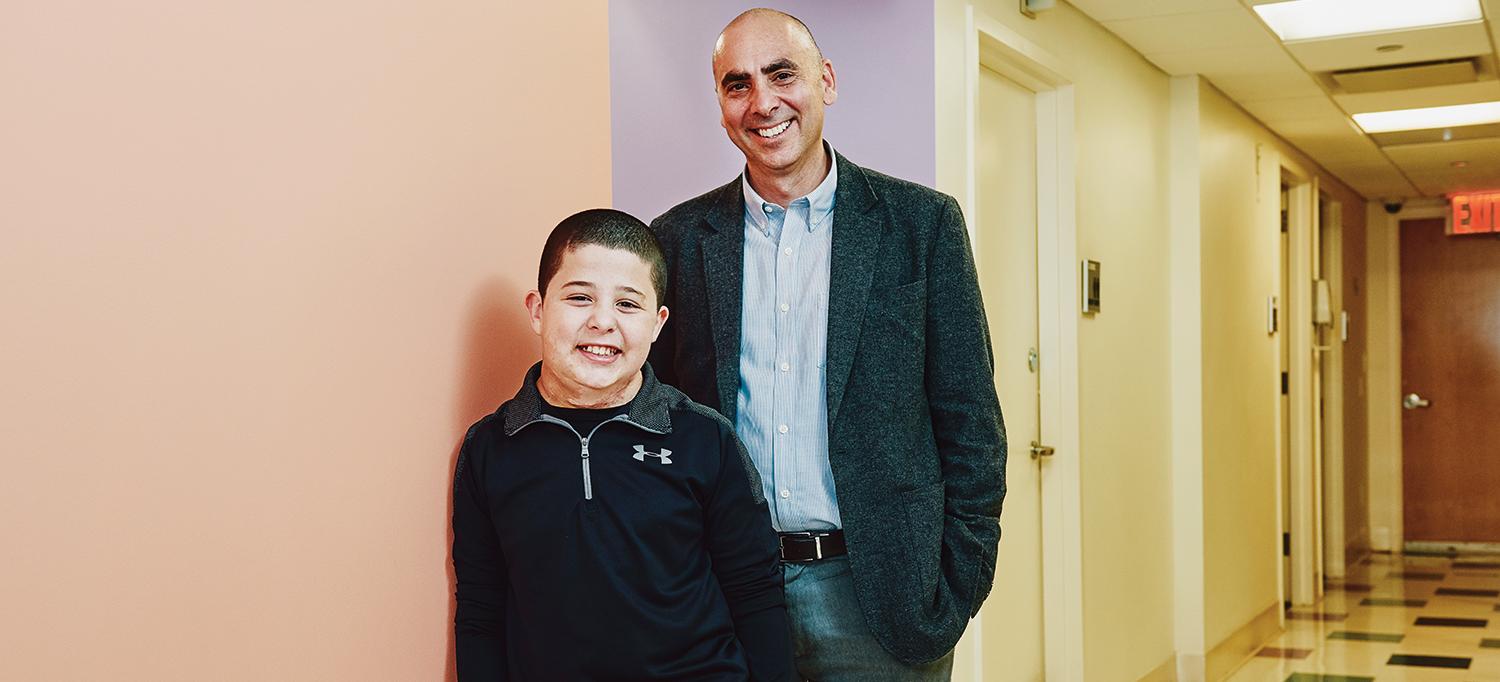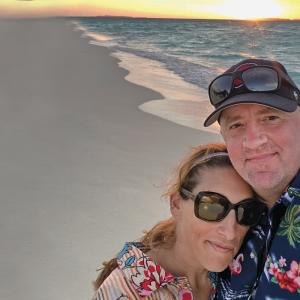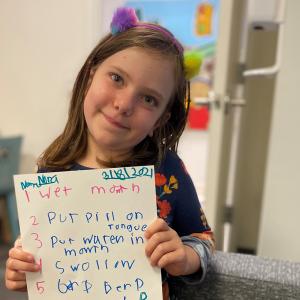
Kaleb H. Yohay, MD, and patient Nicholas Boyer, 11, at the Fink Children’s Ambulatory Care Center, part of Hassenfeld Children’s Hospital at NYU Langone.
Photo: Tony Luong
Dani and John Boyer knew there was a 50–50 chance that their children might inherit John’s disease. John was born with a genetic condition called neurofibromatosis 1 that causes benign tumors to grow on nerve tissue. Relatively rare, it affects about 100,000 people in the United States. Like many with the condition, John has had few symptoms, aside from some bumps on his skin, so the Boyers had little cause for concern. “For me, it’s a cosmetic issue,” he says. When their first son, Thomas, was born in 2006, his symptoms were so mild that he was 11 before he was even diagnosed.
Then came their second son, Nicholas, born in 2008. Nicky, too, has neurofibromatosis 1, but his experience has shown a far more harrowing side of the disease. The first sign of trouble appeared at age two and a half when a lump emerged on the right side of Nicky’s neck. Six months later, scans revealed a tumor compressing his spine so dramatically that it required emergency surgery to remove it, followed by two spinal fusion procedures to relieve scoliosis. “We had no idea how severe the disease could be,” says Dani.
Neurofibromatosis 1 is caused by a gene mutation that disrupts a cellular pathway common to melanoma and other cancers. It’s incurable; at best, doctors try to manage symptoms, which can vary widely. At NYU Langone Health’s Comprehensive Neurofibromatosis Center, experts in neurology, neurosurgery, neuro-oncology, otolaryngology, and other specialties converge to treat the condition at its most complex.
For Nicky, things got worse. By age 9, the tumor protruding from the side of his neck had swelled to the size of a grapefruit. An MRI revealed that it had expanded extensively inside his body, too, encasing his lungs and the blood vessels leading to his heart, along with the nerves that control swallowing and breathing. With the tumor deemed inoperable, a neurologist at another institution told the Boyers there was no way to stem its growth, and that Nicky would likely require feeding and breathing tubes within five years. “This is our little boy,” says Dani. “There was no way we were accepting that as a final answer.”
A friend whose child also has neurofibromatosis 1 urged the Boyers to schedule an appointment with NYU Langone Health neurologist Kaleb H. Yohay, MD, director of the Comprehensive Neurofibromatosis Center. As part of Hassenfeld Children’s Hospital at NYU Langone, and of the Departments of Neurology and Pediatrics, Dr. Yohay and his team treat more than 850 patients each year, making theirs the largest neurofibromatosis clinic in the nation.
Dr. Yohay offered Nicky a new option. Since 2012, NYU Langone Health has been among 15 medical centers nationwide (and the only site in the tristate area) conducting clinical trials of experimental therapies for neurofibromatosis. Some of the medications, approved for treating cancer, inhibit the cellular pathway that promotes tumor growth by targeting an enzyme called MEK (or mitogen-activated protein kinase kinase). Results so far have been promising: a National Cancer Institute trial found that 72 percent of enrolled patients saw their tumors shrink significantly. “Before this, we didn’t have any medical therapy to offer,” says Dr. Yohay. “It’s a significant breakthrough.”
Nicky started a trial for a MEK inhibitor called binimetinib last February. Within 4 months, the tumor had decreased by 27 percent. Nicky’s jawline, once distorted from the tumor, regained definition. “The day Dr. Yohay gave us the results, he was so happy he was in tears. We all were,” says Dani.
Unfortunately, Nicky was later disqualified from the trial after six months due to unexpected weight gain (a possible side effect of the medication), but Dr. Yohay was undeterred. He encouraged the Boyers to consider a related medication, selumetinib, expected to soon become the first drug approved by the U.S. Food and Drug Administration (FDA) specifically to treat neurofibromatosis 1 tumors. “I’m optimistic we can continue to shrink the tumor and prevent it from growing again,” says Dr. Yohay. “These therapies could be a paradigm shift in dealing with this disease.”
For Nicky, now 11, the good news is just one of many reasons to keep smiling. A preternaturally happy, outgoing boy who wears his scars with pride, he is, in his mom’s words, “the mayor of fifth grade” at PS 19 in the Bronx. His condition has yet to keep him from playing with friends or sideline him from Little League. With the new treatment, the hope is that it never will. “Dr. Yohay has gone way above and beyond to help Nicky,” says Dani. “I only wish we’d found him sooner.”

